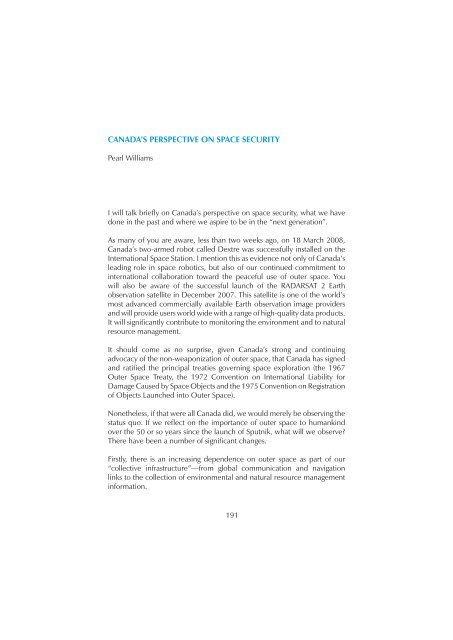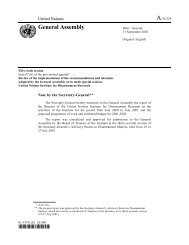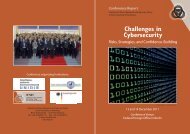Security in Space The Next Generation - UNIDIR
Security in Space The Next Generation - UNIDIR
Security in Space The Next Generation - UNIDIR
You also want an ePaper? Increase the reach of your titles
YUMPU automatically turns print PDFs into web optimized ePapers that Google loves.
CANADA’S PERSPECTIVE ON SPACE SECURITY<br />
Pearl Williams<br />
I will talk briefl y on Canada’s perspective on space security, what we have<br />
done <strong>in</strong> the past and where we aspire to be <strong>in</strong> the “next generation”.<br />
As many of you are aware, less than two weeks ago, on 18 March 2008,<br />
Canada’s two-armed robot called Dextre was successfully <strong>in</strong>stalled on the<br />
International <strong>Space</strong> Station. I mention this as evidence not only of Canada’s<br />
lead<strong>in</strong>g role <strong>in</strong> space robotics, but also of our cont<strong>in</strong>ued commitment to<br />
<strong>in</strong>ternational collaboration toward the peaceful use of outer space. You<br />
will also be aware of the successful launch of the RADARSAT 2 Earth<br />
observation satellite <strong>in</strong> December 2007. This satellite is one of the world’s<br />
most advanced commercially available Earth observation image providers<br />
and will provide users world wide with a range of high-quality data products.<br />
It will signifi cantly contribute to monitor<strong>in</strong>g the environment and to natural<br />
resource management.<br />
It should come as no surprise, given Canada’s strong and cont<strong>in</strong>u<strong>in</strong>g<br />
advocacy of the non-weaponization of outer space, that Canada has signed<br />
and ratifi ed the pr<strong>in</strong>cipal treaties govern<strong>in</strong>g space exploration (the 1967<br />
Outer <strong>Space</strong> Treaty, the 1972 Convention on International Liability for<br />
Damage Caused by <strong>Space</strong> Objects and the 1975 Convention on Registration<br />
of Objects Launched <strong>in</strong>to Outer <strong>Space</strong>).<br />
Nonetheless, if that were all Canada did, we would merely be observ<strong>in</strong>g the<br />
status quo. If we refl ect on the importance of outer space to humank<strong>in</strong>d<br />
over the 50 or so years s<strong>in</strong>ce the launch of Sputnik, what will we observe?<br />
<strong>The</strong>re have been a number of signifi cant changes.<br />
Firstly, there is an <strong>in</strong>creas<strong>in</strong>g dependence on outer space as part of our<br />
“collective <strong>in</strong>frastructure”—from global communication and navigation<br />
l<strong>in</strong>ks to the collection of environmental and natural resource management<br />
<strong>in</strong>formation.<br />
191








